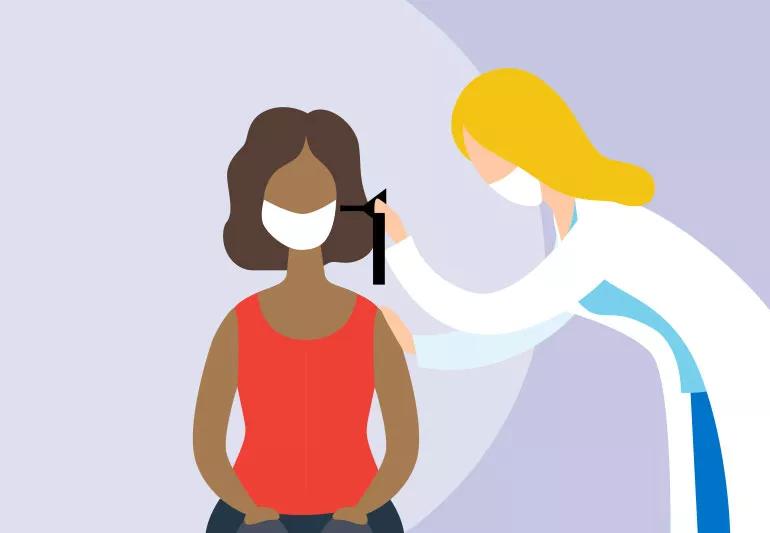Understand the symptoms and find relief

Image content: This image is available to view online.
View image online (https://assets.clevelandclinic.org/transform/6de0c82b-3a2b-4138-a601-01cfd187f09a/ringingEars-1040835202-770x553-1_jpg)
illustration of woman getting her hearing checked by doctor
Ringing in your ears, known as tinnitus, may not seem like a big deal. But for many, it’s a condition that can interfere with your day-to-day activities and quality of life. Thankfully, there are several ways to relieve the problem.
Advertisement
Cleveland Clinic is a non-profit academic medical center. Advertising on our site helps support our mission. We do not endorse non-Cleveland Clinic products or services. Policy
Tinnitus is also a common complaint. Nearly 50 million Americans report some type of tinnitus, according to audiologist Sharon Sandridge, PhD. For about 12 million people, the problem is described as bothersome and impacts their lives.
“Many may have problems sleeping, relaxing or reading a book because the tinnitus is always there,” says Dr. Sandridge. “It can cause stress, anxiety and even depression.”
While the exact cause of tinnitus is typically unknown, one common cause is exposure to sounds that are too loud for too long. If you work in a noisy environment like a factory, construction site, or even a busy and crowded exercise facility, it can expose your ears to levels of sounds that put them at risk. Using power tools, lawnmowers and leaf blowers for extended time periods can harm your hearing, too. One of the first signs of sound-induced damage is the presence of a soft, or sometimes not so soft, ringing in your ears.
Tinnitus is one of the most common service-related disabilities among veterans returning from Iraq and Afghanistan, too, according to the National Institute on Deafness and Other Communication Disorders (NIDCD).
No matter your age, it’s a good idea to take steps to protect your ears and hearing. To reduce your risk, it’s important to physically remove yourself from loud sounds, turn down the volume or wear hearing protection. The longer you are in a loud environment without protecting your ears and hearing, the risk for hearing loss and tinnitus increases.
Advertisement
Besides sound-induced causes, there are a few lesser-known potential causes of tinnitus. They include:
“Before you pursue any non-medical options for tinnitus management, you need to see a doctor to rule out any underlying problem requiring medical or surgical intervention,” says Dr. Sandridge. “The next step is to have a hearing test done by an audiologist to determine if hearing loss could be the cause as well as to determine if you can benefit from sound therapy.”
Unfortunately, at this point, there is no FDA-approved medication to treat tinnitus. The majority of management options are non-medical and should be directed by your audiologist who may work with other specialty professionals such as a dentist, a physical therapist or a psychologist to find the best treatment option for you.
These may include different types of counseling such as cognitive behavioral therapy (CBT), mindfulness therapy, acceptance and commitment therapy (ACT) or sound therapy such as fans, sounds apps on your smartphones, hearing aids or sound generators.
Hearing aids may be the answer to tinnitus for people who have hearing loss.
“By using hearing aids, you not only help reduce the awareness of the tinnitus, but you also improve your ability to hear as well,” says Dr. Sandridge.
Some hearing aids have a built-in sound generator that produces ocean wave sounds or white or pink noise. These sounds provide relief by decreasing your awareness of the tinnitus by having your brain pay attention to the other neutral, non-threatening sounds. This promotes a process called habituation (helping you get to a point where you no longer pay attention to the tinnitus), which eventually will allow you to be aware of your tinnitus only when you actively listen for it.
Advertisement
“In this case, the tinnitus is not gone, but you no longer pay attention to it unless you focus on it,” she says. “Our goal is to get you to the point where you’re basically tuning the tinnitus out.”
All in all, don’t just wait and hope your tinnitus will go away. Talk to your primary care physician and audiologist if you notice ringing in your ears or other problems with your hearing. They can help you pinpoint your problem and help you find the relief you need.
Advertisement

Sign up for our Health Essentials emails for expert guidance on nutrition, fitness, sleep, skin care and more.
Learn more about our editorial process.
Advertisement
COVID-19 may be associated with tinnitus, but research is still ongoing
Routine screenings at school are normal and important
Sudden hearing loss can have many causes — but it’s important to seek treatment fast
Hearing aids can be enough for some people, but other devices — like for your phone, TV and fire alarm — can help, too
Untreated hearing loss can affect kids’ speech and language development and their overall quality of life
Avoid poorly fitting gear, opt for quality devices and consider sound-limiting technology to help prevent noise-induced hearing loss
Reduce background noise, don’t talk too fast or too slow and above all, ask what’s most helpful to them
Ringing is already a sign of damage, but you can take steps to keep your hearing protected
Prioritize your health by managing stress, strengthening your social connections and getting quality sleep
Bolsters, blankets, pillows and blocks can offer extra support, stability and comfort
Allergies, postnasal drip, asthma or reflux could be to blame for a cough that won’t quit